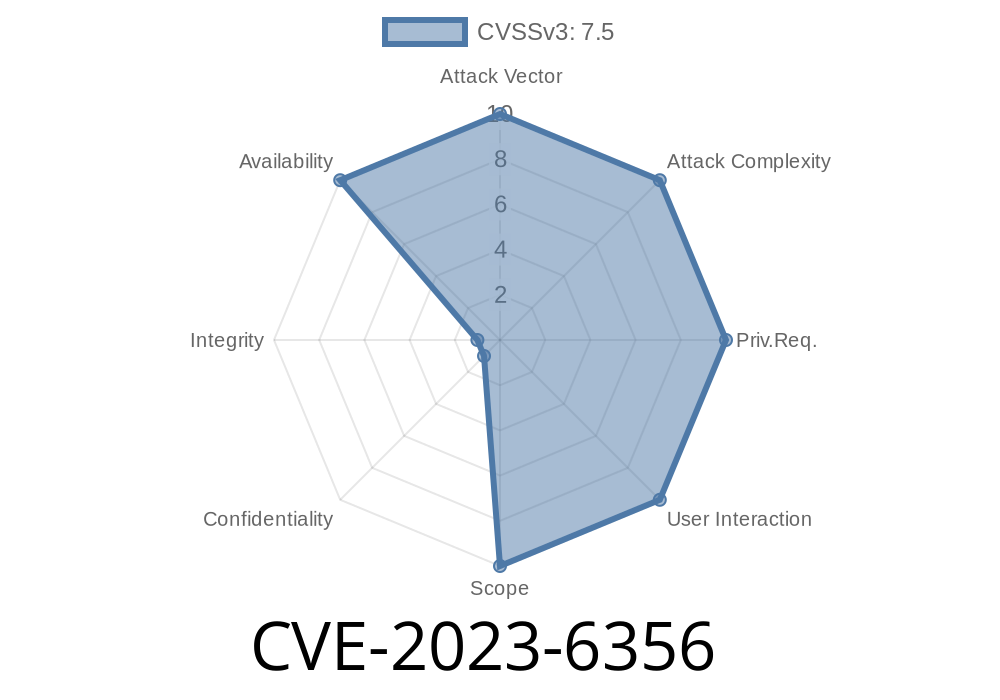In recent months, a dangerous bug with the ID CVE-2023-6356 was found in the Linux kernel's NVMe (Non-Volatile Memory Express) driver, specifically when handling NVMe over TCP (Transmission Control Protocol). This vulnerability might not make headlines like ransomware attacks, but it can still disrupt servers in high-stakes production environments by causing unplanned system crashes and denial of service—without any need for authentication.
Let’s dive into what happened, the technical cause, a demonstration exploit, and direct references for further information.
What is CVE-2023-6356?
This is a vulnerability caused by a coding mistake in the way the Linux kernel handles NVMe over TCP connections. If an attacker crafts and sends a specific set of TCP packets to the vulnerable server, they can trigger a NULL pointer dereference in the kernel's NVMe TCP driver. The result? The server kernel panics—a forced crash, which leads to a complete denial of service.
Why Does It Matter?
NVMe over TCP is often used in data centers and fast storage systems. Impacted systems can be forced to restart, causing service outages or even data loss (if not properly configured for resilience).
The flaw is especially concerning because no authentication is required. This means an attacker anywhere on the same network (or exposed over the internet) could crash your Linux server just by talking to its NVMe TCP port.
How Does It Work?
The problem lies in insufficient validation of incoming TCP packets in the NVMe TCP driver. If an attacker sends malformed or incomplete packets, a specific pointer in the driver code will not be set up properly. Later, when the kernel tries to use that pointer, it crashes.
Vulnerable Code (Simplified)
Here’s an example, inspired by the upstream patch, showing how the issue happens:
struct nvme_tcp_queue *queue = ...;
if (!queue->data) {
// 'queue->data' might be NULL here, but there's no check!
process(queue->data->something); // KERNEL PANIC if 'data' is NULL
}
This code assumes the queue->data pointer is always valid. If it isn’t (because the attacker sent the right crafted packet to set up the structure in a weird way), the kernel will dereference a NULL pointer and crash.
Cause in Kernel Code
The actual problematic function is nvme_tcp_process_data_pdu in drivers/nvme/host/tcp.c. Before Linux 6.7, this function could work with uninitialized values if the PDU was malformed, leading directly to a NULL pointer dereference.
Demonstration Exploit
Warning: Do NOT run this on any production system! This is educational only.
Open a raw TCP socket to the target's NVMe TCP port (usually 442).
2. Send a manually crafted PDU (Protocol Data Unit) that triggers the driver to process a connection with insufficient setup.
Example Exploit (Python, for demonstration)
import socket
TARGET = '192.168.1.100'
NVME_TCP_PORT = 442
# This is a minimal malformed PDU fragment.
malformed_pdu = b'\x00' * 8 # Tiny payload, not a real NVMe PDU
with socket.create_connection((TARGET, NVME_TCP_PORT)) as s:
s.sendall(malformed_pdu)
print("Malformed PDU sent. If target is vulnerable, it may panic.")
This example doesn’t use a real NVMe PDU, but with a bit more protocol knowledge, a more precise packet could be crafted to guarantee a crash.
How to Fix It
The good news: Linux kernel maintainers patched this issue quickly.
Patched in: Linux kernel 6.7 (released December 2023).
If you are at risk:
References and Further Reading
- CVE-2023-6356 at NVD
- Kernel Patch Commit
- Red Hat Security Advisory
- Explaining NULL Pointer Dereference
Conclusion
CVE-2023-6356 is a clear example of how small mistakes in kernel code can have big consequences for stability and security. If you run Linux servers using NVMe over TCP, patch now and keep your firewall rules tight. For attackers, this bug allowed easy denial of service—so don’t wait until it happens to you!
Timeline
Published on: 02/07/2024 21:15:08 UTC
Last modified on: 03/12/2024 03:15:06 UTC
